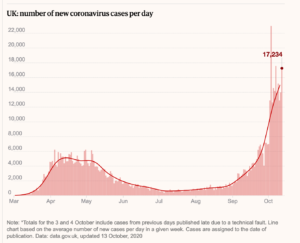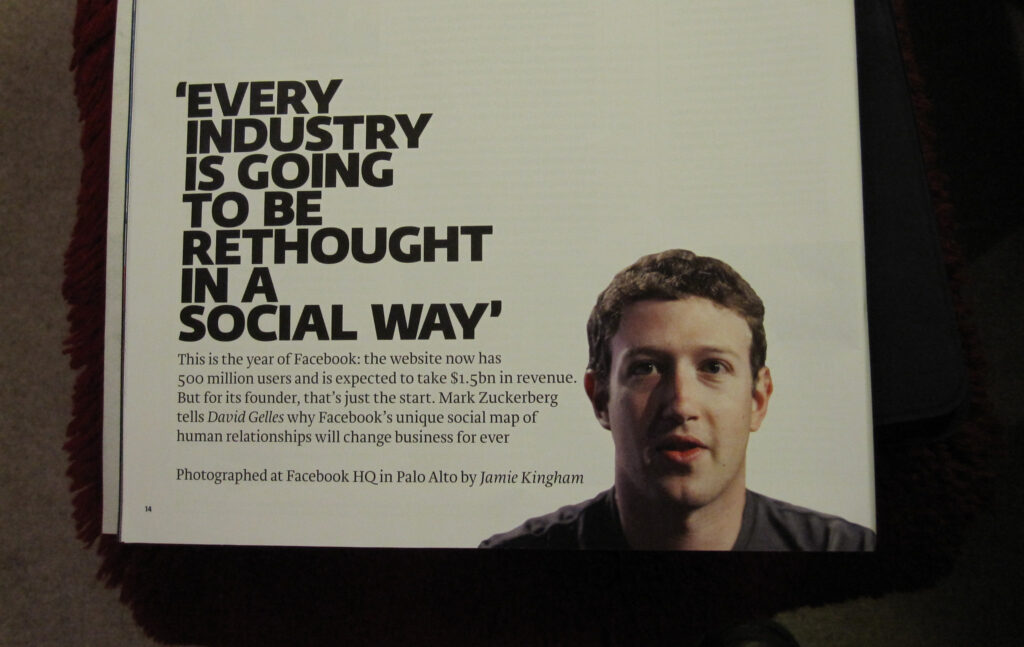
Quote of the Day
”One man is as good as another until he has written a book.”
Musical replacement for the morning’s radio news
Leo Kottke: Snorkel
Link
Boris Johnson’s latest Covid strategy: no hope and no end in sight
John Crace on Boris Johnson’s day in Parliament:

Johnson looked knackered before he even started. His complexion even more pallid than usual and his eyes mere pinpricks. For a moment it looked as if the narcissist had been confronted with his own sense of futility. A situation that he couldn’t bend to his will, no matter how delusional the thought process. He is cornered by hubris: a man hating every second of his life but condemned to experience its unforgiving horror. Not even the health secretary could be bothered to attend to watch this latest meltdown.
“We have taken a balanced approach,” Johnson began. As in he was too slow to react back in March with the result that the government has one of the world’s highest death tolls. As in he did next to nothing during the summer when we had a chance to prepare for autumn. As in he actively encouraged people to go back to work for weeks before switching to advise them against it. As in unlocking the north at the same time as the south, even though infection rates in the north remained higher. That kind of balanced.
What Boris had to offer now was a new three-tier approach. Bad, very bad and very, very bad. Bad would apply to most of the country and would involve people doing pretty much what they had been doing for the last couple of months. Rule of six and all that.
Very bad would mean that those areas that had already been under the more stringent lockdown restrictions would remain so, though if you wanted to meet a few friends outdoors in the garden for a beer to let each other know how depressed you were feeling you now could. And very, very bad meant that you could only see your mates if you happened to be in the pub at the same time and order five Cornish pasties to go with your bottle of scotch.
NYT ‘The Daily’ podcast’s view on the prospects for the vaccine
From the transcript of the Wednesday, October 7, edition.
Presenter: As update on the state of the coronavirus in the U.S. I check back in with Times science reporter, Donald G. McNeil, Jr.
Donald, you recently sent me an email that pretty much stopped me in my tracks. Because in it, you said that you were optimistic about the course of the pandemic. And that is not a word that I associate with either you or the pandemic. And it immediately made me think that we needed to talk.
McNeil: I am short term, right now — fall and winter — pessimistic. I think things are going to get worse.
But since I’ve been saying since April or so that this epidemic is not going to be over by Easter, this epidemic is not going to be over by fall, and that, you know, the record for making the vaccine is four years, I now have new optimism about how fast I expect vaccines and other interventions to get here, and how quickly that will bring the pandemic to an end in the United States…
Interesting. McNeil is very well informed. And he was ahead of the curve in the early days. Basically, he thinks there may be workable vaccines (plural) by the Spring on 2021 — and that people will be willing to take them.
Presenter: In our conversations with colleagues like Jan Hoffman, we have established that there is a considerable amount of skepticism around vaccines in general — and especially this coming set of vaccines — because of how much politics has surrounded them.
McNeil: Yeah. And I agree with that skepticism. I mean, if a vaccine is approved before Election Day, and it is approved by only one man — I’m Donald J. Trump and I approve this vaccine — then I’m a skeptic and I’m not going to take it. But when I see vaccines that are okayed by Tony Fauci and Paul Offit and Francis Collins and Peter Hotez and all the vaccine experts that you often see quoted on television, then I’m going to be one of the first in line to get it.
And what will probably happen, I think, is that a lot of people will be skeptical. And then they’ll look around at their friends and neighbors who take the vaccine. And assuming nothing goes wrong, and that’s an assumption, but assuming nothing goes wrong, they’ll go, huh. I can avoid this vaccine for me and my kids that I’m somewhat afraid of. And that means I have to homeschool my kids forever. Never go to a movie. Never get on an airplane. Never eat in a restaurant again. Or I can accept a vaccine. I think I’ll take the vaccine.
He’s probably right.
My new keyboard

I have arthritis in my hands, which is not good news for someone whose job involves writing. What it mostly means, though, is that I’m very sensitive to keyboards. A few weeks ago I decided that I’d had enough of Apple’s latest ‘Magic’ keyboard, and so looked for an alternative. Someone suggested I look at the Logitech MX Keys wireless keyboard, so I bought one. And it’s just terrific. More bulky and clunkier than its Apple predecessor, of course, but quite a joy to use. Highly recommended for writers with delicate fingers.
Facebook to ban content that denies or distorts the Holocaust
From a Guardian report:
Facebook says it is updating its hate speech policy to ban content that denies or distorts the Holocaust.
The decision comes two years after its chief executive, Mark Zuckerberg, said in an interview with the tech website Recode said that while he found Holocaust denial deeply offensive, he did not believe Facebook should delete such content.
“I’ve struggled with the tension between standing for free expression and the harm caused by minimising or denying the horror of the Holocaust,” said Zuckerberg, who is Jewish, in a Facebook post on Monday.
My own thinking has evolved as I’ve seen data showing an increase in antisemitic violence, as have our wider policies on hate speech,” he said.
The social media company said that, starting later this year, it would also direct people searching for terms associated with the Holocaust or its denial to credible information away from the platform.
Nice to know that his ‘thinking’ has “evolved”. I often wonder what exactly is wrong with this guy.
Is science being set up to take the blame?
Ross Anderson, whom God preserve, was puzzled by the failure to protect residents in care homes, and so decided to read the minutes of the SAGE committee whose advice the Prime Minister was supposedly following.
Here’s an excerpt from his terrific blog post reporting what he found.
The big question, though, is why nobody thought of protecting people in care homes. The answer seems to be that SAGE dismissed the problem early on as “too hard” or “not our problem”. On March 5th they note that social distancing for over-65s could save a lot of lives and would be most effective for those living independently: but it would be “a challenge to implement this measure in communal settings such as care homes”. They appear more concerned that “Many of the proposed measures will be easier to implement for those on higher incomes” and the focus is on getting PHE to draft guidance. (This is the meeting at which Dominic Cummings makes his first appearance, so he cannot dump all the blame on the scientists.)
On March 10th, they decide to cocoon the over-70s and medically vulnerable, and advise 7/14 days isolation for people with symptoms / their families. They advise that “special policy consideration be given to care homes and various types of retirement communities” – but note the passive voice, and this doesn’t appear on the list of actions and trigger points on the following page. It’s still somebody else’s problem.
By March 13th, some care homes had already banned visitors without waiting for government advice to do so, and on the same day SAGE decided that the goal was to enable the NHS to meet demand. Two days later, the NHS started clearing 30,000 beds, sending hundreds of infected patients into care homes and causing thousands of deaths.
The next month is consumed with panic about whether the NHS will be swamped by the peak, and it’s only when this subsides that we read on April 14 that more and more cases are acquired in hospital, which have been masking the decline in the community, with a note “Care homes remain a concern. There are less data available from these” – but only as item 10 on the situation update. At last there’s a relevant action: to widen viral sampling in hospitals and care homes. However the committee’s effort is now tied up with the controversy about whether to advise public mask wearing. (It still resists expert advice on this as it doesn’t want to admit that its initial position was wrong.) The meetings on April 16 and 21 are also consumed by the mask debate (on which the early members of the committee, who blocked mask wearing to protect PPE supplies to the NHS, prevailed over the newer members, leaving the UK an outlier).
And Ross’s conclusion?
My experience of university committees makes this all just too painfully familiar. What’s failed here is not the science, but the process of government. The committee started out full of NHS medics and bureaucrats, and lots of theoreticians – modelers aplenty – but there’s still nobody from the care sector. The members focus on the NHS they know and stay in their comfort zone. And now, we might ask, is there anybody with operational experience relevant to running a large testing and tracing programme? Or would it be a waste of time to try to create such a competence in the SAGE environment?
Terrific post.
This blog is also available as a daily email. If you think this might suit you better, why not subscribe? One email a day, delivered to your inbox at 7am UK time. It’s free, and there’s a one-click unsubscribe if you decide that your inbox is full enough already!




